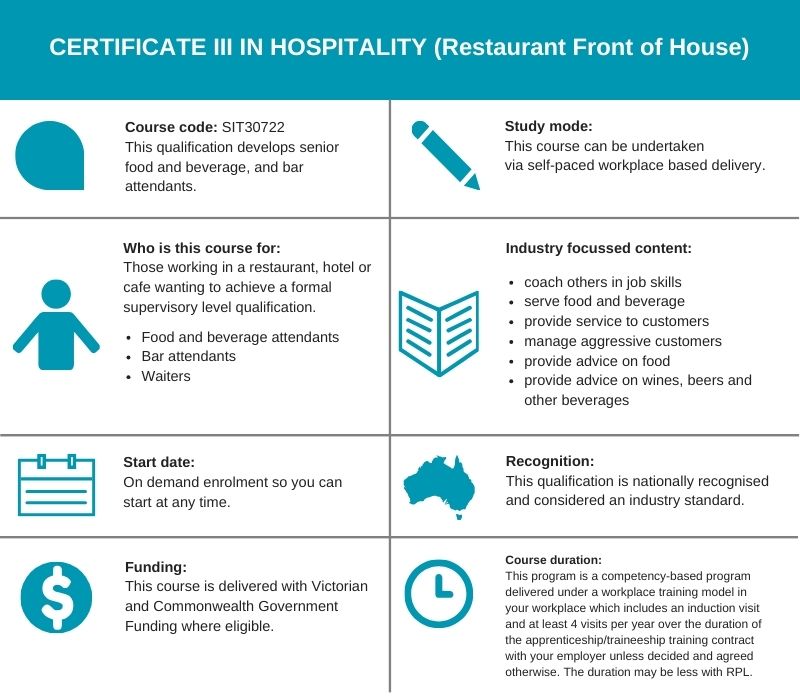Course Structure and Units
| CORE UNITS (NINE) | |
| SITXWHS005 | Participate in safe work practices |
| SITXFSA005 | Use hygienic practices for food safety |
| SITHIND006 | Source and use information on the hospitality industry |
| SITXCOM007 | Show social and cultural sensitivity |
| SITHFAB021 | Provide responsible service of alcohol |
| SITXCCS014 | Provide service to customers |
| SITHIND008 | Work effectively in hospitality service |
| SITXFIN007 | Process financial transactions |
| SITXHRM007 | Coach others in job skills |
| RESTAURANT STREAM ELECTIVE UNITS (ELEVEN) | |
| BSBSUS211 | Participate in sustainable work practices |
| SITXCOM010 | Manage conflict |
| SIRXCEG008 | Manage disrespectful, aggressive or abusive customers |
| SITHFAB034 | Provide table service of food and beverage |
| SITHFAB025 | Prepare and serve espresso coffee |
| SITHFAB031 | Provide advice on beers, spirits and liqueurs |
| SITHFAB032 | Provide advice on Australian wines |
| SITHFAB036 | Provide advice on food |
| SITXINV006 | Receive, store and maintain stock |
| SITXINV007 | Purchase goods |
| SITXINV008 | Control stock |
| HOTEL/BAR STREAM ELECTIVE UNITS (ELEVEN) | |
| SITXCOM010 | Manage conflict |
| SIRXCEG008 | Manage disrespectful, aggressive or abusive customers |
| SITHFAB027 | Serve food and beverage |
| SITHFAB036 | Provide advice on food |
| SITHFAB022 | Clean and tidy bar areas |
| SITHFAB023 | Operate a bar |
| SITHFAB031 | Provide advice on beers, spirits and liqueurs |
| SITHFAB032 | Provide advice on Australian wines |
| SITXINV007 | Purchase goods |
| SITXINV006 | Receive, store and maintain stock |
| SITXINV008 | Control stock |
Front of House Apprenticeship
The Certificate III in Hospitality (Restaurant Front of House) qualification is recognised as a front of house apprenticeship.
Pre-requisites
There are no pre-requisites for entry to the Certificate III in Hospitality (Restaurant Front of House) course.
Employment Outcomes
This Front-of-House Apprenticeship is a specialist qualification that provides a pathway to work in various front of house roles in restaurants, hotels, bars and cafes. Possible job titles include senior food and beverage attendant, waiter, bar attendant, sommelier.
All nationally recognised qualifications also cover a range of general employability skills required in the hospitality industry. Including communication, teamwork, problem solving, initiative and enterprise, planning and organisation, self-management, learning and technology.
Enrolment
To enrol in this course you must be at least 15 years old. The course can be delivered on a full-time or part-time basis. It is suitable for a range of employees, as well as school based apprentices.
AVTES welcomes students from disadvantaged groups or with disabilities to apply.
Email hello@avtes.com.au to enrol now.
Fees
Course prices for the Certificate III in Hospitality (Restaurant Front of House).
| Stream | Tuition Fees (SFP – T/A) | Tuition Fees (SFP – T/A Concession) | Tuition Fees (Full Fee / RPL) |
| Restaurant | $1,002.60 | $200.52 | $8,410.70 |
| Hotel/Bar | $948.60 | $189.72 | $7,957.70 |
Our Fees page covers how we set our fees and includes refund information. It adheres to government requirements set annually. All fees are based on qualification program hours and tuition fees may vary depending on units/hours undertaken and student tuition fees as published are subject to change given individual circumstances at enrolment.
Government Funding
This course is eligible for government funding. To see if you meet eligibility requirements check out our Government Funding Opportunities page, or simply contact us directly.
Course Duration and Delivery Mode
This program is a competency-based program delivered under a workplace training model in your workplace which includes an induction visit and at least 4 visits per year over the duration of the apprenticeship/traineeship training contract with your employer unless decided and agreed otherwise. The duration may be less with RPL.
Training Hours and Commitment
To ensure a student meets and progresses through their course requirements and completes within the nominated duration, it is recommended they commit time each week to complete course work and assessments and attend any scheduled visits with the Trainer.
The specific number of hours to commit will vary and depend on the capacity of each individual. Under the workplace training model, the workplace is required to provide an (full-time) Apprentice or Trainee 3 hours per week withdrawn from normal or routine duties for the purpose of this training.
Note: Weekly hours committed to the program will vary depending on the unit of competency being undertaken.
Assessment Methods
Assessment of this course may involve the following types of assessment.
- Short answer questions
- Knowledge tests
- Projects
- Practical tasks
- Supervisor verification
- Demonstrations
- Recognition of prior learning (RPL)
RPL and Credit Transfers
RPL, or recognition or prior learning, is available to all applicants. You will need to provide a portfolio of supporting evidence upon enrolment. We honor credit transfers from all current nationally recognised training. You will need to provide statements of attainment from your previous study. To find out more about how to provide information for credit transfers or RPL see here.
Further Training Opportunities
This qualification can form part of an Australian Apprenticeship pathway. Upon completion of this qualification, there are further opportunities to study at a Certificate IV or Diploma level in either a hospitality or other related qualification as offered by a Registered Training Organisation.

